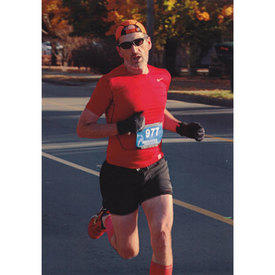How Other Americans Helped Meb Win Boston

RunConquerCelebrate
Posts: 956 Member
I had no idea that this type of stuff happened in a elite race.
Meb Keflezighi earned his victory in the Boston Marathon but he got help from some friends, too.
So there have been rumors, tweets and innuendos flying around for the past two days since Meb Keflezighi won the Boston Marathon.
Were there strategic tactics at play in the middle of the race—possibly by other American runners—that allowed Keflezighi and Josphat Boit to both get and maintain a big lead?
Yes, absolutely!
Ryan Hall admitted as much after the race and other Americans, including Nick Arciniaga, Craig Leon and Jason Hartmann all seem to concur. But that’s not to suggest a fix was in or that Keflezighi didn’t earn his victory. He totally did—every last step to the finish line—but there’s always more to a race story than the final results.
Once Keflezighi and Boit got out front of the big lead pack near the 9-mile mark, many of the other top African runners—many of whom have PRs of 2:07 of better—were content to let them go. While Keflezighi was on 2:07-2:08 pace, the chase pack was moving slow—in the 2:12 pace range—at that point, When Arciniaga, Leon, Hartmann or Abdi Abdirahman tried to push move to the front of that pack and push the pace, Hall wouldn’t let them.
“It’s true,” Hall told Sports Illustrated’s Tim Layden. “I kept telling (the other Americans) not to (push the pace), that we needed to give Meb as much space as possible. If the African guys were going to try to catch him, we weren’t going to do the work to help them. It wasn’t my day to win, as much as I wanted to. Meb winning was the next best thing and what the U.S. needed.”
Those kind of tactics happen all the time in marathons (and to a lesser degree longer events on the track), it’s just that Americans aren’t involved very often and it doesn’t make news in the U.S.—at least not among running fans, age-group runners and message board posters—if it’s primarily strategizing between East Africans. Kenyans often work together against Ethiopians, and vice versa. Athletes of the same sponsor or same training group often work together the same way professional cyclists work together in the Tour de France and NASCAR drivers sponsored by the same team employ blocking, slipstreaming and bumper-banging.
The fact that Kenyan Wilson Chebet, one of the pre-race favorites who entered the Boston Marathon with a 2:05:27 marathon PR, had to work like heck to reel Keflezighi back just shows that Chebet, who eventually finished second, was on the wrong side of the tactics or just misplayed his cards. Or perhaps worse, he didn’t respect Keflezighi effort enough to stick with him. Lesson learned.
But that’s marathoning at the elite level. It’s somewhat unique at the Boston Marathon, which doesn’t have official pacesetters paid to lead the runners on a fast pace through a certain point.
What’s not known is whether Boit, a recently naturalized U.S. citizen who trains in Mammoth Lakes, Calif., was in on it too or whether Keflezighi was able to play off Boit and quickly dispatch him too. Either way, Keflezighi did his part and ran his tail off all the way to Boylston. That he ran a 31-second PR (2:08:37) on the verge of turning 39 years old speaks to his dedication and tenacity.
The women’s race had tactics, too, although that race played out much more simply. American Shalane Flanagan shot to the front at the start and was insistent on pushing the pace through the first 15 miles. But that turned out too be a poor tactic, only because so many runners were content to sit behind her and let her do the work. Flanagan thought a 2:22 time could win the race, but she wound up setting the stage for one of the fastest women’s marathons in history. Once Flanagan faded, eventual champion Rita Jeptoo fed off the other runners and eventually blasted to the front with a huge surge to secure her second straight Boston Marathon win and third overall. (Flanagan ran 2:22:02 and so she didn’t really fade as much as the other runners benefitted from her early efforts playing the rabbit.)
To his credit, Hall, who formerly trained with Keflezighi in Mammoth Lakes, Calif., sensed the opportunity and made it all happen. He’s the fastest American marathoner in history with a 2:04:58 PR at Boston in 2011 and yet, he realized early on that it might be Keflezighi’s day to win.
As much as runners can say a lot of things in the pre-race press conferences, the athletes know what’s going on. They know who’s fit and who’s ready to break one off. And certainly, Hall sensed that about Keflezighi. That Hall acted so selflessly and faded to a 20th-place showing in 2:17:50 speaks volumes about how much he believes in Keflezighi, a longtime training partner, friend, rival and 2012 Olympic teammate.
It turned out to be a banner day for American men all the way around. Aside from Keflezighi’s win, Arciniaga ran close to his personal best and finished seventh in 2:11:57, while Jeff Eggleston ran a new PB (2:11:57) and finished eighth. Leon, a relative unknown, came within a second of his personal best with a 12th-place, 2:14:28 finish and Mike Morgan did the same with a 2:14:40 effort that put him in 13th.
No doubt, they benefitted from Hall’s tactics, too. If nothing else, they held on to a moderate pace and waited until the pace increased once Chebet finally mounted a charge after Keflezighi. Hall has witnessed the same kind of teamwork from Kenyan runners work against him many times, so, whether he was being patriotic or just turning the tables, all is fair in love, war and the marathon.
Read more at http://running.competitor.com/2014/04/news/americans-helped-keflezighi-win-boston_101087#BF2ArtbWhOi3Sglu.99
Meb Keflezighi earned his victory in the Boston Marathon but he got help from some friends, too.
So there have been rumors, tweets and innuendos flying around for the past two days since Meb Keflezighi won the Boston Marathon.
Were there strategic tactics at play in the middle of the race—possibly by other American runners—that allowed Keflezighi and Josphat Boit to both get and maintain a big lead?
Yes, absolutely!
Ryan Hall admitted as much after the race and other Americans, including Nick Arciniaga, Craig Leon and Jason Hartmann all seem to concur. But that’s not to suggest a fix was in or that Keflezighi didn’t earn his victory. He totally did—every last step to the finish line—but there’s always more to a race story than the final results.
Once Keflezighi and Boit got out front of the big lead pack near the 9-mile mark, many of the other top African runners—many of whom have PRs of 2:07 of better—were content to let them go. While Keflezighi was on 2:07-2:08 pace, the chase pack was moving slow—in the 2:12 pace range—at that point, When Arciniaga, Leon, Hartmann or Abdi Abdirahman tried to push move to the front of that pack and push the pace, Hall wouldn’t let them.
“It’s true,” Hall told Sports Illustrated’s Tim Layden. “I kept telling (the other Americans) not to (push the pace), that we needed to give Meb as much space as possible. If the African guys were going to try to catch him, we weren’t going to do the work to help them. It wasn’t my day to win, as much as I wanted to. Meb winning was the next best thing and what the U.S. needed.”
Those kind of tactics happen all the time in marathons (and to a lesser degree longer events on the track), it’s just that Americans aren’t involved very often and it doesn’t make news in the U.S.—at least not among running fans, age-group runners and message board posters—if it’s primarily strategizing between East Africans. Kenyans often work together against Ethiopians, and vice versa. Athletes of the same sponsor or same training group often work together the same way professional cyclists work together in the Tour de France and NASCAR drivers sponsored by the same team employ blocking, slipstreaming and bumper-banging.
The fact that Kenyan Wilson Chebet, one of the pre-race favorites who entered the Boston Marathon with a 2:05:27 marathon PR, had to work like heck to reel Keflezighi back just shows that Chebet, who eventually finished second, was on the wrong side of the tactics or just misplayed his cards. Or perhaps worse, he didn’t respect Keflezighi effort enough to stick with him. Lesson learned.
But that’s marathoning at the elite level. It’s somewhat unique at the Boston Marathon, which doesn’t have official pacesetters paid to lead the runners on a fast pace through a certain point.
What’s not known is whether Boit, a recently naturalized U.S. citizen who trains in Mammoth Lakes, Calif., was in on it too or whether Keflezighi was able to play off Boit and quickly dispatch him too. Either way, Keflezighi did his part and ran his tail off all the way to Boylston. That he ran a 31-second PR (2:08:37) on the verge of turning 39 years old speaks to his dedication and tenacity.
The women’s race had tactics, too, although that race played out much more simply. American Shalane Flanagan shot to the front at the start and was insistent on pushing the pace through the first 15 miles. But that turned out too be a poor tactic, only because so many runners were content to sit behind her and let her do the work. Flanagan thought a 2:22 time could win the race, but she wound up setting the stage for one of the fastest women’s marathons in history. Once Flanagan faded, eventual champion Rita Jeptoo fed off the other runners and eventually blasted to the front with a huge surge to secure her second straight Boston Marathon win and third overall. (Flanagan ran 2:22:02 and so she didn’t really fade as much as the other runners benefitted from her early efforts playing the rabbit.)
To his credit, Hall, who formerly trained with Keflezighi in Mammoth Lakes, Calif., sensed the opportunity and made it all happen. He’s the fastest American marathoner in history with a 2:04:58 PR at Boston in 2011 and yet, he realized early on that it might be Keflezighi’s day to win.
As much as runners can say a lot of things in the pre-race press conferences, the athletes know what’s going on. They know who’s fit and who’s ready to break one off. And certainly, Hall sensed that about Keflezighi. That Hall acted so selflessly and faded to a 20th-place showing in 2:17:50 speaks volumes about how much he believes in Keflezighi, a longtime training partner, friend, rival and 2012 Olympic teammate.
It turned out to be a banner day for American men all the way around. Aside from Keflezighi’s win, Arciniaga ran close to his personal best and finished seventh in 2:11:57, while Jeff Eggleston ran a new PB (2:11:57) and finished eighth. Leon, a relative unknown, came within a second of his personal best with a 12th-place, 2:14:28 finish and Mike Morgan did the same with a 2:14:40 effort that put him in 13th.
No doubt, they benefitted from Hall’s tactics, too. If nothing else, they held on to a moderate pace and waited until the pace increased once Chebet finally mounted a charge after Keflezighi. Hall has witnessed the same kind of teamwork from Kenyan runners work against him many times, so, whether he was being patriotic or just turning the tables, all is fair in love, war and the marathon.
Read more at http://running.competitor.com/2014/04/news/americans-helped-keflezighi-win-boston_101087#BF2ArtbWhOi3Sglu.99
0
Replies
-
Great story! Meb ran an amazing race, but glad to see that the other Americans were willing to help out in whatever small way they could.0
This discussion has been closed.
